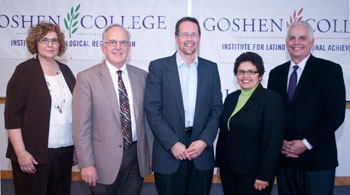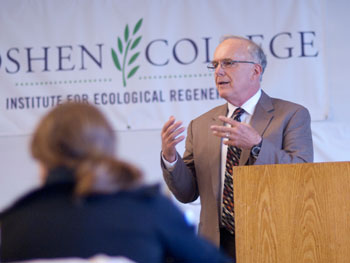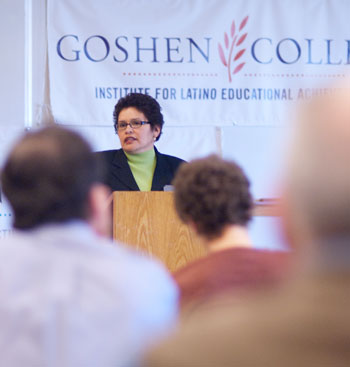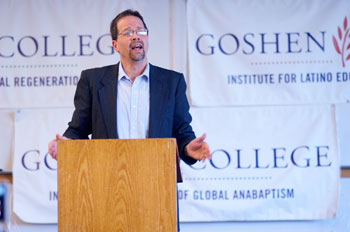Goshen College launches institutes focused on ecological regeneration, Latino educational achievement and global Anabaptism

GOSHEN, Ind. – An “exciting new chapter” has begun at Goshen College, according to the college’s President James E. Brenneman on March 24 as he launched three institutes, all focused on the college’s distinctive academic strengths as they relate to faith.
“Today, I’m pleased to formally announce the creation and launch at Goshen College of the Institute for the Study of Global Anabaptism, the Institute for Ecological Regeneration and the Institute for Latino Educational Achievement,” said Brenneman at a gathering on campus. “Naming these distinctive programs as identifiable institutes will make explicit the quality of our academic work and I believe these institutes will enhance our vision of becoming a truly interdisciplinary, integrative liberal arts college.”
Academic Dean Anita Stalter added, “An institute is a place of study, reflection, analysis and education. The focus of each institute will be achieved by conducting and collaborating on research, delivering academic programming, and sharing what is learned with others.”
Institute for Ecological Regeneration
The Institute for Ecological Regeneration, under the umbrella of Merry Lea Environmental Learning Center, “will be committed to bringing renewal and vitality to ecosystems through research and education,” said Luke Gascho, executive director of Merry Lea and director of the institute. “Humankind is part of – not separate from – local, regional, national and global ecosystems. Humans have adversely impacted many natural systems — necessitating the call for transformative practices. The institute will study natural history, biotic and abiotic systems and the intersecting human dynamics. The institute will use the best investigative techniques and apply imagination to achieve an improved care and stewardship of creation. Principles of faith and shalom will guide the choice of actions to bring regeneration to ecological issues.”

The projects and programs of the institute will be designed on the integration of four core themes: land, community, faith and peace. “The intersection of these four themes will create a powerful synergy,” Gascho said. Conducting research, maintaining field collections and data, delivering formal academic courses, hosting symposia and disseminating learnings through various media to an array of publics will achieve the goals of the institute.
“The institute provides a context for studying, integrating and applying the interdisciplinary constructs of resilience of the land, responsibilities of people in community, and commitments to peace and justice,” Gascho said.
The current and planned programs of the institute include the agroecology summer intensive and a sustainability semester in residence for undergraduate students, a master’s in environmental education, and conferences and symposia on topics of ecological stewardship. Undergraduate and graduate students will have direct involvement in the goals of the institute through various research projects.
For more information about the Institute for Ecological Regeneration, visit www.goshen.edu/institutes/eco. Questions about the Institute for Ecological Regeneration can be directed to Dr. Luke Gascho: (260) 799-5869; lukeag@goshen.edu
Institute for Latino Educational Achievement

The Institute for Latino Educational Achievement is the research arm of the Center for Intercultural Teaching and Learning (CITL) at Goshen College. The research agenda of the institute is focused on factors that impact the academic success of Latino students in higher education settings, particularly in small liberal arts colleges in the Midwest.
“Findings from research will be used to improve educational practices at Goshen College that impact the academic success of Latino students,” said Rebecca Hernandez, director for CITL and the institute. “Improving the educational success of Latino students is a relevant issue locally, regionally and globally. The Latino population continues to grow across the United States and it is imperative that the factors leading to their academic achievement be both identified and put into practice in higher education institutions.”
The current and planned research of the institute includes a three-part series titled “Latinos in Northern Indiana”; research on faculty and students of color in the Council of Christian Colleges & Universities (CCCU); and community, schools and families action research. Undergraduate students, along with faculty and visiting research fellows, will participate in the institute’s research agenda.
For more information about the Institute for Latino Educational Achievement, visit www.goshen.edu/institutes/latino. Questions about the Institute for Latino Educational Achievement can be directed to Dr. Rebecca Hernandez: (574) 535-7775; rhernandez@goshen.edu
Institute for the Study of Global Anabaptism

In recent decades, the most dramatic growth in the Anabaptist-Mennonite family of faith — as in the Christian church more generally — has occurred in countries outside of Europe and North America. There are 1.7 million Anabaptist-Mennonites in the world, representing 227 groups in 83 countries. “From the perspective of five centuries of Anabaptist history, this is a phenomenal development that is transforming the character and future of the tradition,” said John D. Roth, director of the Mennonite Historical Library, Goshen College Professor of History and director of the new Institute for the Study of Global Anabaptism. “Mennonites in North America are vaguely aware of this transformation, but we have not been clear about the details of what is unfolding or about its larger significance and meaning.”
The institute – a program of the college’s Mennonite Historical Library (MHL), one of the world’s most comprehensive collections related to Anabaptist and Mennonite history– will build on a rich tradition at Goshen College of Anabaptist-Mennonite studies, the unique oncampus resources of the Mennonite Church USA Archives and the expertise of faculty. The institute will help to nurture a new generation of scholarship and exchange explicitly oriented to the global Anabaptist church. “The institute will serve as a visible and vibrant point of intersection between Goshen College students, Mennonite Church USA, the worldwide Anabaptist communion and the rapidly expanding global Christian church,” Roth said.
The current and planned research of the institute includes the Global Anabaptist Wikipedia, a Global Anabaptist History publication series and participation in the Multi-Nation Anabaptist Profile. The current and planned programs of the institute includes regular conferences, international partnerships with Anabaptist Study Centers, visiting scholars and church leaders and hosting of global church partners. Each year, the institute will identify a Goshen College international student who is associated with a Mennonite church to serve as a student intern or research assistant, as well as offering other student research opportunities.
For more information about the Institute for the Study of Global Anabaptism, visit www.goshen.edu/institutes/anabaptism. Questions about the Institute for the Study of Global Anabaptism can be directed to Dr. John D. Roth: (574) 535-7433; johndr@goshen.edu




